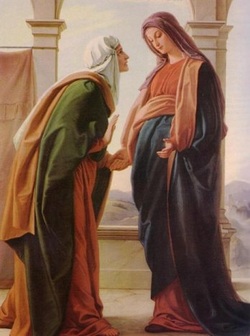
The two were cousins, and Mary thought it would be
kind to go to Ain-Karim to visit her relatives and make herself useful in the house. She would much rather have stayed at home just now, but she did not listen to likes and dislikes; when God put a good thought into her mind, or wanted a service of her, she obeyed at once. And so, without considering it beneath her to serve others, or lay her hands to household work, she set off in haste on her long journey. No one, not even Joseph whom she loved so tenderly, had been told of Gabriel's visit, for Mary disliked notice as much as some young girls seek it, and she was afraid of honour and praise. One of the prophets had said: "My secret to myself, my secret to myself." This was Mary's rule all her life through. We are not told whether she went alone, but it is most unlikely. If Joseph did not go with her, she probably joined some of her relatives who were on their way to the Holy City. At last she came upon the rising ground of Judea, and, climbing the rugged side of a mountain, found herself at the door of Zachary's home. Elizabeth was standing on the threshold as if expecting someone. Mary hastened towards her, and saluted her with loving words. But what was her surprise when the aged woman, instead of returning her embrace, sank on her knees and cried out: "Blessed art thou amongst women, and blessed is the fruit of thy womb. And whence is this to me that the Mother of my Lord should come to me ?"
Her secret, then, was known. God, Himself, must have told Elizabeth. Mary's heart was full, full to overflowing. She could not keep back its burst of joy and praise: "My soul doth magnify the Lord," she said, " and my spirit hath rejoiced in God my Saviour. Because He hath regarded the humility of His handmaid; for behold from henceforth all generations shall call me blessed. Because He that is mighty hath done great things to me, and holy is His name. And His mercy is from generation unto generations to them that fear Him. He hath shewed might in His arm; He hath scattered the proud in the conceit of their heart. He hath put down the mighty from their seat and hath exalted the humble. He hath filled the hungry with good things, and the rich He hath sent empty away. He hath received Israel His servant, being mindful of His mercy, As He spoke to our fathers, to Abraham and to his seed for ever."
Elizabeth listened in silence and in awe. She knew by heart the triumphant hymns of God's servants in the past, but there was not one like this. Mary's song was the sweetest earth had ever heard. It sank into the heart of the aged saint. It sounds through the Church for ever. Every day it is on the lips of thousands of her children. It teaches us many lessons, and among them this—that it is not proud and wrong to know that we have gifts of God entrusted to us, gifts of fortune, gifts of body or of mind. There is no harm in knowing we are well off, or good-looking, or clever, or kindhearted.
Harm comes in when we forget that whatever good we have is the gift of God and that we shall have to account to Him for it, and that in the meantime we have to use it in His service who gave it. Mary understood as no other will ever do what "great things " God had done for her, things so great that all generations should call her blessed. But all the glory was His. Of herself she was nothing, and had nothing. She rejoiced in God her Saviour as we do, only more, because He had done more for her. She magnified the Lord as we should do, because He had looked down on the humility, that is, the littleness of His handmaid. It is no humility, then, to pretend not to know what God has done for us. The really humble, like the grateful poor, are quick to acknowledge kindness and to show themselves thankful. Gratitude and humility go hand in hand. There is no better shield against vanity and self-conceit than Mary's words : "He who is mighty hath done great things for me;" and when our hearts are stirred to praise God for His goodness to us, we shall find none more fitting than those of her beautiful Magnificat.
For three months Mary stayed with her cousin, and all that time God's richest blessings were poured out upon the family of Zachary, because of her presence there. At the first sound of her voice the Holy Ghost had so inspired Elizabeth that she reechoed Gabriel's words: "Blessed art thou among women," adding to them the praise of Mary's Son: "Blessed is the fruit of thy womb." When we repeat these words in the Hail Mary, it will help us to remember the reverence with which they were said by an Archangel and a saint at the feet of her whom Elizabeth called " the Mother of my Lord."
A Printable file of this chapter as well as a coloring picture can be found below.
|
| ||||
 RSS Feed
RSS Feed